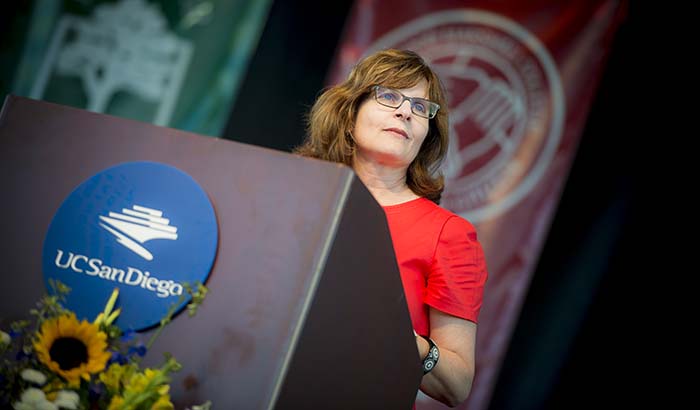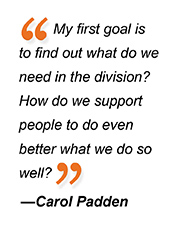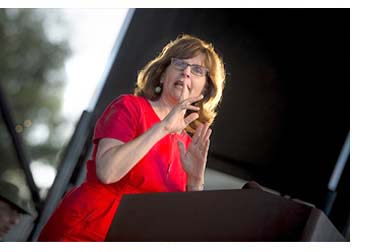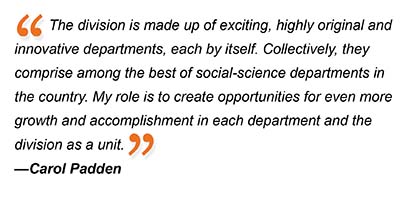Carol Padden: Sign-Language Scholar, MacArthur Winner, Doctoral Alumna – and Now the New Dean of Social Sciences

Photos by Erik Jepsen/UC San Diego Publications.
When Carol Padden stood up to speak at this year’s division retreat as the incoming dean of Social Sciences, she interrupted herself and fanned her face with both hands: “Hurry up,” she said. “Someone, take a picture. I can’t believe this is happening.”
A longtime member of the UC San Diego community – first as a graduate student in Linguistics, then as a faculty member in Communication and, for the last few years, an administrator, too – Padden is a MacArthur “Genius” Award-winning scholar of sign languages. She was named the division’s fourth dean in June 2014, after an extensive national search. Her appointment begins Oct. 1.
Padden follows Jeff Elman, a distinguished professor of Cognitive Science, who is returning to his work on campus as an internationally recognized scholar of psycholinguistics and artificial neural networks. The two first met in 1978 when she was an entering doctoral student at UC San Diego and he was a new assistant professor.
“I thought I’d died and gone to heaven when Jeff asked me to be associate dean [in 2008]. If he had wanted to be dean forever, I would have been perfectly happy to be associate dean forever, too,” Padden said. “I really quite honestly had not thought about being dean until he said that he wanted to step down and go back to research and teaching. I love doing field work and will have to give up some of that now...
“But then I came to think of this job as an extension of what I was already doing in the lab, in the classroom and in the community. I am deeply committed to bringing my passion for teaching, research and service to this position,” she said. “My first goal is to find out what do we need in the division? How do we support people to do even better what we do so well?”
Among the first cohort to be hired as permanent faculty into UC San Diego’s Department of Communication, Padden has been on the faculty since 1983, when she earned her Ph.D. from the university’s Department of Linguistics. An affiliate member of the Center for Research in Language, the Human Development Program and the Department of Education Studies, Padden served as associate dean and faculty equity advisor in the Division of Social Sciences from 2008 to 2013. In early 2014, she was tapped to be the university’s interim vice chancellor for equity, diversity and inclusion.
Padden’s main areas of research are language emergence, sign language structure, and cultural life in deaf communities. She plays a central role in promoting research on sign languages around the world and in shaping policy and practices that promote the full participation of deaf people in society.
“I can think of no better collaborator than Carol Padden to help advance UC San Diego’s vision of being a student-centered, research-focused, service-oriented public university,” said UC San Diego Chancellor Pradeep K. Khosla. “Carol’s distinguished record of achievement – beginning as a student at our campus and continuing to this day as a researcher and as an administrative leader – will serve our university, and also our region and nation, advancing the important work of the social sciences.”
As dean, Padden will lead a dynamic and highly ranked academic division spanning 10 academic departments and 16 interdisciplinary programs and research centers that focus on some of the most pressing and important social issues of our time.
“Carol is a respected and admired scholar who has proven to be an effective leader and consensus builder in her administrative service to the campus,” said Suresh Subramani, executive vice chancellor for academic affairs at UC San Diego. “Her passion for and historical knowledge of UC San Diego will be invaluable as she works with the social sciences faculty and students to further the interdisciplinary and cross-divisional research collaborations envisioned in our strategic plan. She is a great listener, but above all she is very analytic and solution oriented. I am delighted that she has agreed to join the Academic Affairs leadership team as dean of the Division of Social Sciences.”
Holder of the Sanford I. Berman Chair in Language and Human Communication, Padden was named a recipient of the MacArthur Fellowship, popularly known as the “genius grant,” in 2010. The John D. and Catherine T. MacArthur Foundation cited her for “illuminating the unique structure and evolution of sign languages and the specific social implications of signed communication.”
 Other distinctions include being elected a fellow of the American Association for the Advancement of Science and the Linguistic Society of America. She is also a recipient of the John Simon Guggenheim Fellowship, a UC San Diego Faculty Research Lecture award, a UC San Diego Chancellor’s Associates Outstanding Faculty award and a Laurent Clerc Cultural Award for distinguished contributions to the field of deafness.
Other distinctions include being elected a fellow of the American Association for the Advancement of Science and the Linguistic Society of America. She is also a recipient of the John Simon Guggenheim Fellowship, a UC San Diego Faculty Research Lecture award, a UC San Diego Chancellor’s Associates Outstanding Faculty award and a Laurent Clerc Cultural Award for distinguished contributions to the field of deafness.
Her research is funded by the National Institutes of Health and the National Science Foundation. She has also received research support from the U.S. Department of Education and the Spencer Foundation.
Padden has published widely in areas relating to language evolution, culture and genes, comparative sign language structure, reading in deaf children and deaf community history.
Together with her husband Tom Humphries – who is also a member of the UC San Diego Division of Social Sciences’ faculty and is currently serving as vice chair of Education Studies – Padden has published two textbooks on American Sign Language and two ground-breaking books about the history of the deaf community in the U.S.
In 2005, Padden, with colleagues from the University of Haifa and Stony Brook University, published an analysis of word order in Al-Sayyid Bedouin Sign Language, a language created in a small village in Israel’s Negev Desert. The PNAS paper was the first linguistic analysis of a new language arising naturally with no outside influence, and the findings made headlines in national and international press. In 2008, New York Times reporter Margalit Fox chronicled her travels with Padden’s research team in a book titled “Talking Hands: What Sign Language Reveals About the Mind.”
Padden was born in Washington, D.C., the second deaf child of deaf parents who were both on the faculty at Gallaudet University. She first attended a school for deaf children but transferred to the public school system in third grade. It was a long adjustment for her and one she describes as being “akin to being educated abroad.” Her interest in linguistics and culture, she writes, “is strongly rooted” in those formative experiences of “moving between different worlds and languages,” between the hearing world and the familiarity of signed language at home.
Padden says she became interested in pursuing linguistics as a career toward the end of high school. She earned a B.S. in the field from Georgetown University in 1978, at which point she joined UC San Diego as a graduate student. She worked closely with pioneering linguists Ed Klima and Ursula Bellugi, at UC San Diego and the Salk Institute for Biological Studies, who were among the first to show that signed languages were full-fledged languages.
 When Padden arrived, UC San Diego was physically smaller and there were fewer students and staff. “But it still feels like the same campus to me,” she said. “There is a fluidity of movement – across departments and disciplines – that was true then and still is. Departments and research units reach out to others and are welcoming to scholars of different types of training. Mesa relationships with neighboring research institutes are also strong. Collaborative work among institutions is in our DNA.”
When Padden arrived, UC San Diego was physically smaller and there were fewer students and staff. “But it still feels like the same campus to me,” she said. “There is a fluidity of movement – across departments and disciplines – that was true then and still is. Departments and research units reach out to others and are welcoming to scholars of different types of training. Mesa relationships with neighboring research institutes are also strong. Collaborative work among institutions is in our DNA.”
Padden and Humphries have a hearing daughter, Jacy Humphries, who is bilingual in ASL and spoken English. Jacy is currently a doctoral student in biology at UC San Diego, and Padden is enjoying seeing the university through her daughter’s eyes.
“Our graduate students mirror the faculty,” Padden said. “They are very open to collaborations and friendships across departments. There’s a wealth of opportunities to hear about each other’s work.”
UC San Diego feels to her daughter as it did, and does, to her, Padden said: “like a youthful university – new and filled with possibilities.
“Everything I have accomplished, I accomplished here,” she said, “I’m sure I wouldn’t have been able to do it elsewhere. I have never felt the campus saying ‘no, that’s not possible.’
Padden is honored to be part of the university’s history and thrilled to be asked to help shape its future and the future of the division.
“The division is made up of exciting, highly original and innovative departments, each by itself,” she said. “Collectively, they comprise among the best of social-science departments in the country. My role is to create opportunities for even more growth and accomplishment in each department and the division as a unit.”
At the UC San Diego Convocation in fall 2013, Padden said to incoming students: “A university education is not just about courses you will take and the friends you make here, but it’s about becoming a person. Being here, you will find out who you really are and what you are really capable of.
“Learn your value system and your own truth, and how to apply this insight in any area of study,” she said. “Acquire flexibility in your point of view.”
In her new role as dean, she intends to follow her own advice and plans to work closely with the students, faculty and staff in the Division of Social Sciences, helping the division continue doing its groundbreaking work on the science of society – pursuing research, teaching and service in the public interest.
Learn more
- Convocation Keynote Urges Students to See World Through Eyes of Those With Different Point of View
- 2010 MacArthur Fellow
- Video of Padden discussing her research
- This Week @ UC San Diego feature: Watching the Birth of a Language
- ABSL or Al-Sayyid Bedouin Sign Language Findings
- Q&A on deaf culture with husband Tom Humphries
